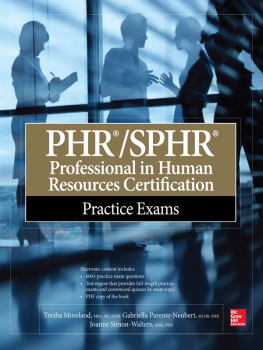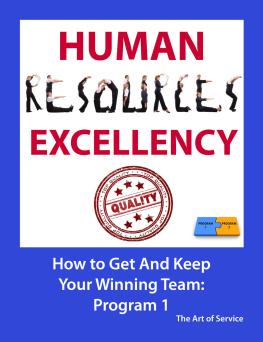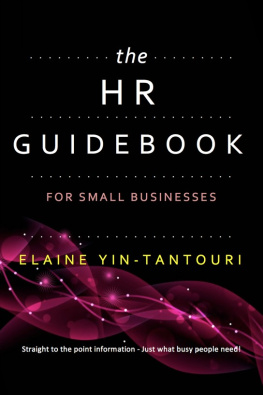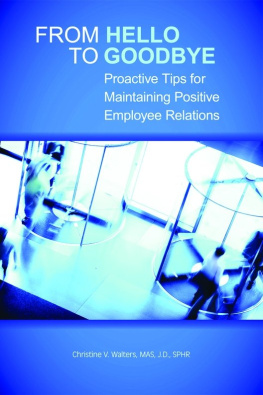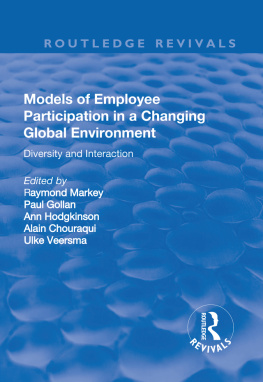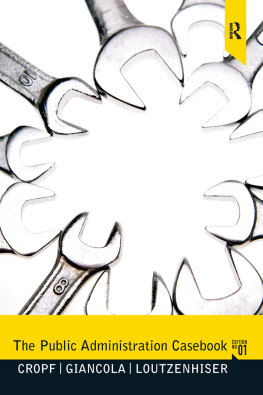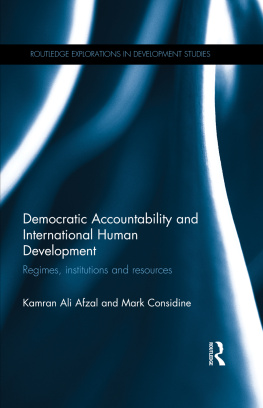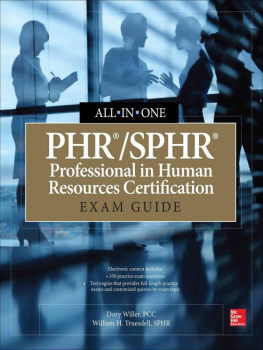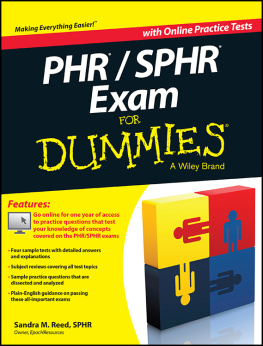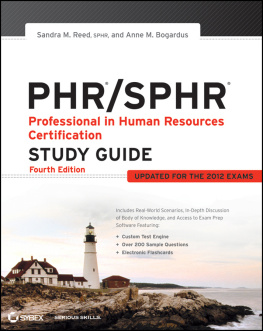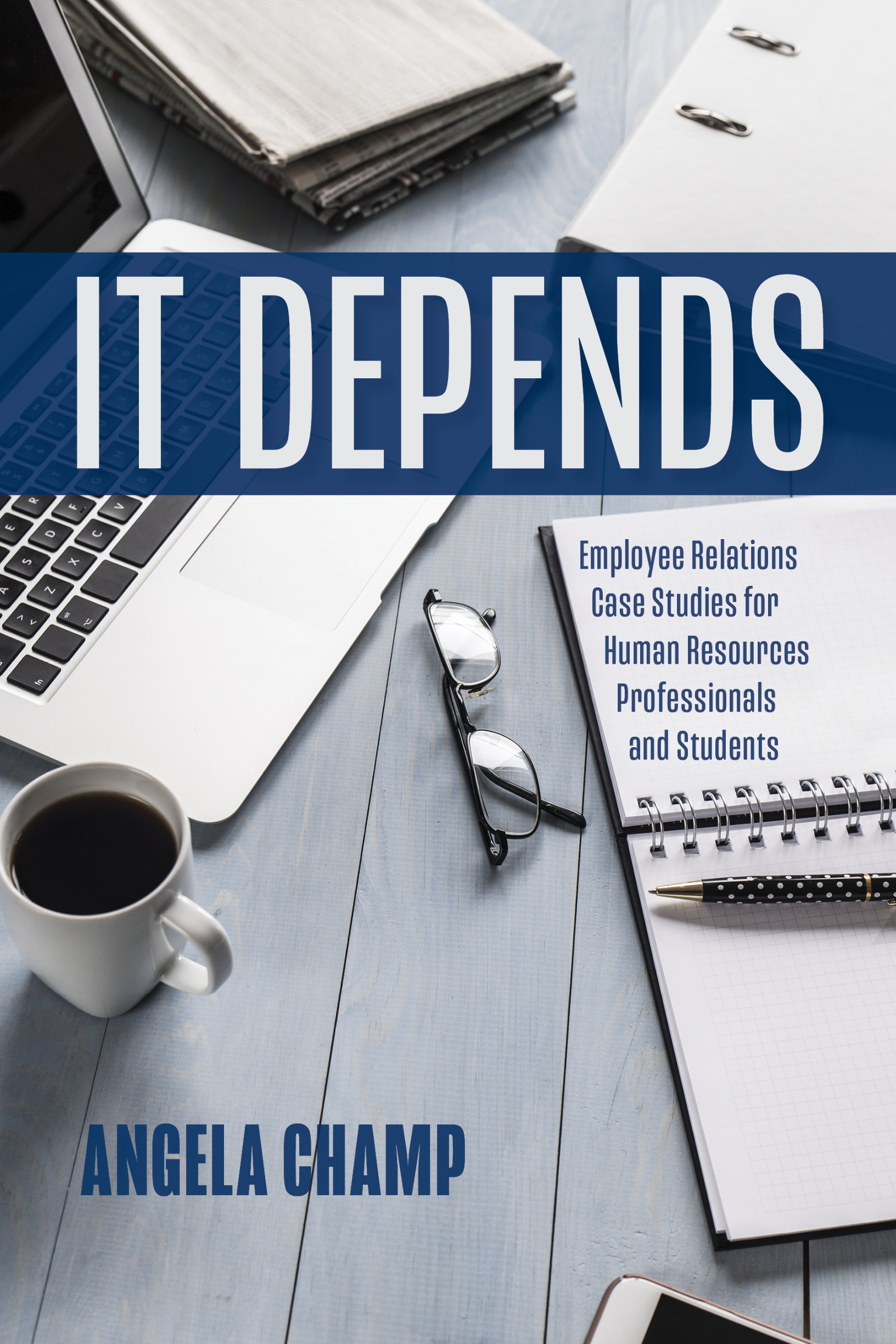It Depends
Employee Relations Case Studies for
Human Resources Professionals and Students
Angela Champ
Table of Contents
Introduction
The classic answer to just about every Human Resources issue is it depends, and this collection of case studies demonstrates exactly why.
There is no one correct answer to the case studies in this book; however, there is usually one that is more correct than others. Employee relations are complex and nuanced, and the specific circumstances of a situation can change the outcome even when they appear identical to another situation; this illustrates why we must take a contextual approach when dealing with employee relations, including:
- The misconduct or incident in question;
- The length of the employment relationship;
- The nature of the employees position and duties, and whether there is an extra burden, accountability or fiduciary duty on that employee;
- Any prior discipline;
- The employees explanation for the misconduct or incident.
This book is intended for Human Resources students or any professional looking to increase their employee relations skills. The case studies in this collection are a composite of situations that you could realistically face in many non-unionized organizations. (For the purposes of this book, unionized case studies are not included as the outcome is often less it depends and more What does the collective agreement say? While legislation and common law do apply in unionized environments, the process for discipline, up to and including termination, is often spelled out in collective agreements.) While representative of real cases, any resemblance to organizations or persons, living or dead, is purely coincidental.
Use these case studies for discussion and to learn how to get to the best outcome possible. When reviewing these scenarios, research applicable legislation in your jurisdiction and in other provinces, states or countries, to see how the law changes across territories. For example, at the time of publishing this book, twenty-nine states in the United States of America have laws that legalize medical marijuana use while eight states have laws that legalize marijuana for recreational use; Canada is poised to enact similar legislation in 2018, and some other countries, such as Italy, have decriminalized the possession of small amounts of marijuana. This can greatly affect the outcome of the discussion and decisions in Case Study 9 The Drug Dilemma , depending on which country or which state or province you are in.
As well, when reviewing these cases, look up case law to learn how precedence is applied and how common law (or Civil Code in Quebec) changes over time. The discussion questions are deliberately vague so that they can be applied to any jurisdiction, whether in Canada, the United States, or elsewhere in the world.
The minor changes in the various scenarios within each case study are meant to illustrate how small details can affect the outcome of any situation, which is why the classic answer to just about every Human Resources issue is, it depends.
Case Study 1
The Tardy Employee
Scenario 1
Ben is a twenty-four-year-old employee at The Prince Group, a large engineering firm that specializes in civil engineering projects, such as roads, bridges and infrastructure. Ben has been with the company for eight months; prior to this, he worked as a retail sales clerk for a mens store, but joined The Prince Group because he wanted to have better career opportunities. He works in a team of six from 8:00 a.m. to 4:00 p.m. as an Accounts Receivable Representative, and his work includes calling customers regarding outstanding invoices, processing payments, and issuing invoices. While he is not a star at work, he is considered a steady employee who makes few errors.
Ben has an easygoing and pleasant personality. In general, his coworkers like him, and he occasionally goes out for drinks after work with a group of guys from his office. He also just joined the company hockey team. However, Ben has come to work late four times in the past two weeks and his coworkers are starting to notice. Aside from this, there have been no performance or absenteeism issues.
When his manager, Jeff, spoke with Ben about his lateness, Ben replied, Well, I guess Im just not a morning person. Jeff mentioned this to you, his Human Resources representative, in passing during a conversation you were having about other staffing issues on the team.
Discussion Questions
- How would you approach this situation?
- What advice would you give to Jeff?
- What questions would you ask Jeff or Ben?
- What are the contextual circumstances that have to be considered in this scenario that might have an effect on the outcome?
- Would you recommend disciplinary action for Ben? Why or why not? If yes, what sort of discipline would you recommend?
- Would your approach and advice differ if this was a single event versus a repeated event? How would it differ?
Scenario 2
Ben is a twenty-four-year-old employee at The Prince Group, a large engineering firm that specializes in civil engineering projects, such as roads, bridges and infrastructure. He has been with the company for eight months; prior to this, he worked as a retail sales clerk for a mens store, but joined The Prince Group because he wanted to have better career opportunities. He works in a team of six from 8:00 a.m. to 4:00 p.m. as an Accounts Receivable Representative, and his work includes calling customers regarding outstanding invoices, processing payments, and issuing invoices. While he is not a star at work, he is considered a steady employee who makes few errors.
Ben has an easygoing and pleasant personality. In general, his coworkers like him, and he occasionally goes out for drinks after work with a group of guys from his office. He also just joined the company hockey team. However, Ben has come to work late four times in the past two weeks and his coworkers are starting to notice. Ben has also called in sick five times in the past eight months. The company has a sick leave policy that allows for five sick days with pay every year, so Bens sick leave has not been addressed.
When his manager, Jeff, spoke with Ben about his recent lateness, Ben replied, Well, I guess Im just not a morning person. When you, the Human Resources representative, spoke with Ben about this, Ben mentioned that the bus schedule had changed recently and he could not get to the office before 8:20 a.m. because of his reliance on transit.
Discussion Questions
- Do Bens five sick days factor into the approach you would take in this case?
- What are the other contextual circumstances that have to be considered in this scenario that might have an effect on the outcome?
- What advice would you give to Jeff to resolve this issue now that you know that Bens bus does not get him to the office until 8:20? Does Bens reliance on public transport change your advice from Scenario 1?
- Would you recommend disciplinary action for Ben? Why or why not? If yes, what would be appropriate in this case?
- Would your approach and advice differ if this was a single event versus a repeated event? How would it differ?
Scenario 3
Ben is a forty-eight-year-old employee at The Prince Group, a large engineering firm that specializes in civil engineering projects, such as roads, bridges and infrastructure. He has been with the company for eight months; prior to this, he worked as a retail sales clerk for a mens store, but joined The Prince Group because he wanted to have better career opportunities. He works in a team of six from 8:00 a.m. to 4:00 p.m. as an Accounts Receivable Representative, and his work includes calling customers regarding outstanding invoices, processing payments, and issuing invoices. Despite a four-week training period and frequent follow-up by his manager, Ben makes frequent mistakes which require redoing some work to correct the errors.


